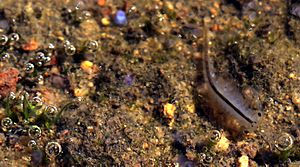Branchinecta sandiegonensis facts for kids
Quick facts for kids Branchinecta sandiegonensis |
|
|---|---|
 |
|
| Tentatively identified as B. sandiegonensis | |
| Conservation status | |
| Scientific classification | |
| Kingdom: | |
| Phylum: | |
| Subphylum: | |
| Class: | |
| Order: |
Anostraca
|
| Family: |
Branchinectidae
|
| Genus: |
Branchinecta
|
| Species: |
B. sandiegonensis
|
| Binomial name | |
| Branchinecta sandiegonensis Fugate, 1993
|
|
The San Diego fairy shrimp, known scientifically as Branchinecta sandiegonensis, is a tiny crustacean. It belongs to the family Branchinectidae and the group called Anostraca, which are often known as fairy shrimp. This special shrimp lives in southern California in the United States and Baja California in Mexico. It is a federally listed endangered species in the United States. This means it is at a high risk of disappearing forever.
About the San Diego Fairy Shrimp
This small fairy shrimp usually grows to be about 8 to 16 millimeters long. That's less than an inch! It's a very small creature that plays an important role in its habitat.
Where It Lives
The San Diego fairy shrimp is found in an area stretching from Santa Barbara, California, down to northwestern Baja California. Most of them live in San Diego County, California. This shrimp makes its home in unique places called vernal pools.
What Are Vernal Pools?
Vernal pools are special ponds that only exist for part of the year. They fill up with water during the rainy season, usually in winter and spring. Then, they dry up completely during the warmer, drier months. These pools are very important because many unique plants and animals, like the San Diego fairy shrimp, can only live there.
Why It's Special
Scientists have found this fairy shrimp in 137 different vernal pool areas. Sadly, many of these pools have been destroyed over time. When a species disappears from an area, it's called extirpation.
However, people are working hard to help the San Diego fairy shrimp. Some vernal pools have been fixed up and protected. The shrimp has even been brought back to some of these restored pools. This helps to make sure this rare and important creature continues to survive.
 | Claudette Colvin |
 | Myrlie Evers-Williams |
 | Alberta Odell Jones |


